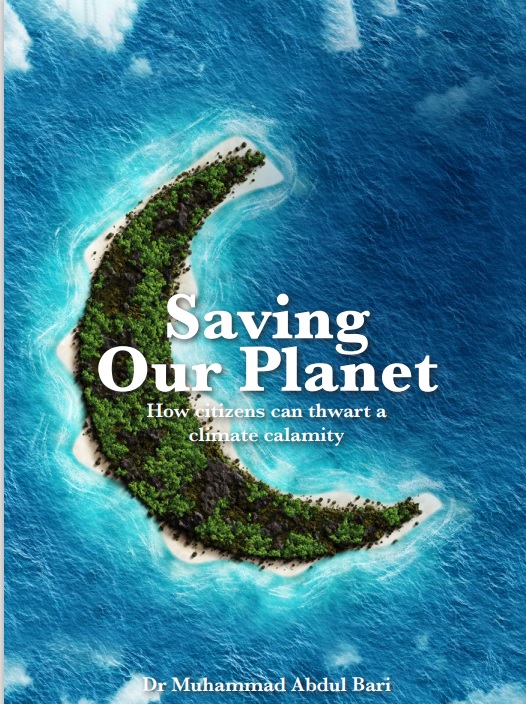
Author: Dr Muhammad Abdul Bari
Year: 2022
Pages: 45
Source: https://tinyrurl.com/nheynw8b
Dr Bari’s timely essay explores the intersection of Science, Politics, Big Business and Religion in responses to an undeniable crisis facing humanity. He is disappointed with the performance of the political leadership but sees hope in the affirmation of humanity’s shared spiritual values. He provides a factually based assessment of the way our ecosystems are facing destruction that will lead to poverty and population displacement. The work is neatly structured with links to websites that provide supporting evidence. It makes a powerful case for a reduction in consumption patterns, particularly in the West when too often the onus is placed on the South to do more, for example through population control or limiting its industrial development projects. The author notes, “this short book is an ardent call for a coordinated common-sense action based on our human obligations to spend prudently, eat wisely and waste less to save our planet from climate calamity.” We now have a comprehensive, concise Muslim perspective that can be put on the top table of any policy discussion on climate change.
For the author, there has been an absence of a political will to take effective action. In part, ‘corrupt politicians’ bear responsibility, who succumb to powerful fossil fuel and agro-chemical lobbies. Dr Bari cites the efforts of Noam Chomsky to expose the Petroleum Institute in the US for campaigns “to try and convince the population that global warming is a liberal hoax.” This may prompt readers of the essay to further explore how big business has funded organizations to challenge the idea that climate change is ‘anthropogenic” i.e. a consequence of human action. We also need to be alert to ‘greenwashing’. A good example is how British Petroleum a few years ago changed its logo from ‘BP’ to a green floral motif!
Perhaps not surprising for someone with a PhD in Physics from London University, Dr Bari expresses an optimism with technological fixes: “As science and technology progress, there is much to be learned about how ecosystems may transform with climate change”. Can we rely on the Western scientific paradigm that has thus far failed to take a holistic view of man and nature?
Two sections of Dr Bari’s essay stand out as valuable reference points, ‘Religions on Environmental Stewardship’ and ‘Islam’s Teachings on Environment’. He notes, “Muslims in particular should be at the forefront in aspiration and action in accordance with Islam’s two primary sources: a) the Quran that was revealed to the Prophet Muhammad (peace and blessings be upon him) in his 23 years of prophethood, and b) the Sunnah (in the form of recorded authentic Hadith) of the Prophet, meaning his sayings, actions and affirmations.” He also adds, “Mosques and Muslim institutions [who] should promote this climate awareness through encouraging and upholding energy saving and waste reducing measures. These institutions can then partner with other concerned groups in the locality to drive change.” The essay highlights the Cambridge Central Mosque as “one fantastic example of eco-friendly design”.
The author also commends the efforts of Muslim civil society at COP26 held in Glasgow in 2021, where “the most representative British Muslim umbrella body, the Muslim Council of Britain, also organised an Environmental Sustainability conference in collaboration with the University of Manchester’s Sustainable Consumption Institute (SCI) and Muslims in Britain Research Network (MBRN). One of the key aims of the conference was to set out how Muslim communities can be involved in designing and implementing environmental policy and initiatives engagement”. The MCB also issued its ‘6-Step Guide to Eco-Friendly Mosques’ during COP26 and Secretary General Zara Mohammed delivered a keynote address in the ‘Muslims and Sustainability’ event.
The essay aptly begins with the hadith, “Even if the Resurrection were established upon one of you while he has in his hand a sapling, let him plant it”. That is, the social function of religion should be ever present in our minds.
Dr Bari’s effort has a well-deserved appreciation from journalist Peter Oborne, ““This wonderful book, so full of common sense and wisdom, shines a light on the great crisis of our time. I thoroughly recommend it.” It should motivate us to keep abreast of climate change issues.
JS/December 2022
